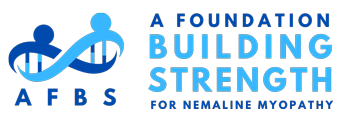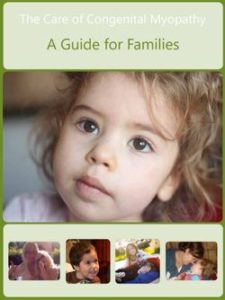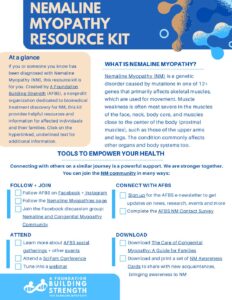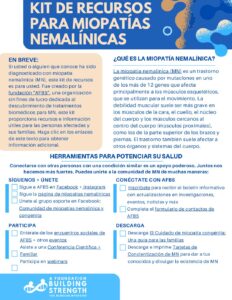Care Guides for Families & Physicians
For Families
The Care of Congenital Myopathy: A Guide for Families is a comprehensive and valuable resource for those with Nemaline Myopathy. Outlined by chapter, the guide represents the expertise and experience of medical professionals and families from all around the world.
It is important for the doctors taking care of you, or your loved one, to help draft a care plan. This care plan may change over time and should prioritize the most pressing health concerns, their surveillance, and management. Most importantly, the care plan needs to be communicated and coordinated between various subspecialists taking care of you. This chapter is divided into three topics: diagnostic visits, outpatient visits, and hospital visits.
Congenital myopathy is a neuromuscular disorder affecting muscles under voluntary and involuntary control. While weakness is the primary symptom, congenital myopathy can affect many different body systems and lead to additional health concerns and symptoms.
Good airway management and treatment may enable an infant, child, or adult, to have a better quality of life and a longer life. Breathing issues can be treated by providing a person with breathing support devices, which can take over the effort of breathing to increase breath volumes or assist with coughing.
The branch of medicine that deals with the prevention or correction of injuries and issues of the bones, muscles, joints, and ligaments is known as orthopedics. Muscles control the position and movement of the bones, so it makes sense that muscle weakness would likely lead to problems with the bones of the body.
Feeding and swallowing difficulties are common in CM and can result in poor nutritional status and other health problems. Some children and adults are not able to eat safely by mouth due to swallowing problems either early in life or later in life. Maintaining good nutrition along with gut and dental health is important because it improves growth, energy levels, amount of activity, and breathing ability.
The medical team members who will care for this aspect of your health include a speech/swallow/feeding therapist, gastroenterologist, neuromuscular specialist, pulmonologist, occupational therapist, and a nutritionist or dietician.
One way to confirm the diagnosis of CM is to perform genetic testing, often done using a blood sample from the patient. The two most common genetic tests are sequencing and deletion/duplication testing. Sequencing reads through all the letters in the gene, looking for any errors or “misspellings”. Deletion/duplication testing looks for large chunks of code that are missing or extra. There are many types of gene changes that can be identified through genetic testing.
Switching to a group of adult specialists may cause worry or doubt, but with some preparation, the transition can be smooth. Adult neuromuscular multidisciplinary teams function in a very similar manner as the pediatric teams. Most multidisciplinary teams consists of a cardiologist, neurologist, pulmonologist, wheelchair specialist and rehabilitation specialists that either work together in the same clinic or in collaboration.
Coping and acceptance of a CM diagnosis can change over time. Many find that the time period right after the initial diagnosis is the most challenging emotionally. Finding the coping strategies that work best takes time. A happy, joyful family life is possible for people with CM.
Often, the best support comes from developing relationships with other people who have been there. Even if they don’t share the same diagnosis you’re dealing with, many of the feelings they have experienced are the same. Online groups for your diagnosis, as well as local support groups for people with disabilities and families, can be invaluable resources.
The guide is also available in Spanish, Russian and Polish languages.
For Physicians & Care Providers
Given their relatively low incidence, congenital myopathies remain unfamiliar to the majority of care providers, and the levels of patient care are extremely variable. The International Standard of Care Committee for Congenital Myopathies developed this Consensus Statement on Standard of Care for Congenital Myopathies, which aims to provide care guidelines for congenital myopathies.
Nemaline Myopathy Resource Kit
If you or someone you know has been diagnosed with Nemaline Myopathy (NM), this resource kit is for you. Created by A Foundation Building Strength (AFBS),this kit provides helpful resources and information for affected individuals and their families. (Available in English & Spanish.)
Online Support Groups
Whether it’s you, your child or loved one that has been diagnosed with NM, we’re ready to help you along this journey. We are an international group of people affected in some way by NM. Think of our community as your source for support, information and connections.




